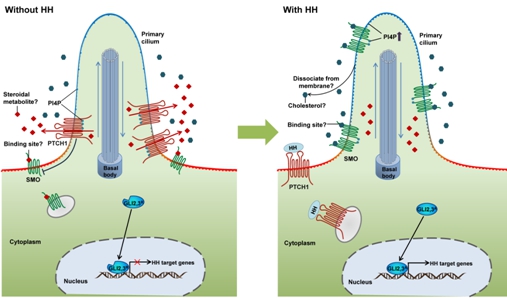Hedgehog (HH) signaling plays an important role in certain types of adult stem cells and cancer stem cells. Its aberrant activity is linked to degenerative diseases and a multitude of cancers. Considerable interest has focused on studying the mechanisms of HH signaling pathway and the identification of drugs that modulate the pathway activity. Decades of work delivered successful cancer therapies out of basic biology, exemplified by two leading drugs, vismodegib and sonidegib, recently approved by the U.S. Food and Drug Administration (FDA) for treatment of advanced skin cancer.
Studies on chemical modulation mechanisms, especially those of important therapeutic targets such as the HH pathway, attract a great deal of interest, as they often open new avenues towards innovative therapies. Previously, in recognition of their work on this topic, Professor Yu Wang at the Institute of Zoology, Chinese Academy of Sciences, and Professor Andrew P. McMahon from University of South California were invited by the journal Elife to comment on latest work from scientists at Stanford, Harvard, and Oxford on newly discovered mechanisms of chemical modulation of HH signaling.
( https://elifesciences.org/content/2/e01680 ).
Lately, upon request by Cell Chemical Biology, Yu Wang and colleagues wrote a review entitled “Hedgehog Signaling: From Basic Biology to Cancer Therapy”. They discussed latest advances in better understanding of the regulatory mechanisms of the HH pathway, especially chemical regulation mechanisms. They proposed a hypothetical working model for endogenous chemical modulation, whose mechanism remains a major mystery in the field. Further, experiences and lessons learned from decades’ long therapeutic development targeting the HH pathway were discussed. Suggestions of more precise interventions for better therapeutic outcomes were given. Lastly, underlining mechanisms of drug resistance were covered and ideas to circumvent it were discussed. This, hopefully, would inspire further development towards next generation cancer therapies.
This paper has been published in volume 24, 2017 of Cell Chemical Biology. Fujia Wu is the first author and Yu Wang is the corresponding author of the paper. Yu Zhang and Bo Sun, members of the Wang laboratory, and Professor Andrew P. McMahon also contributed to this work. The authors thank support from colleagues in the Institute of Zoology and the State Key Laboratory of Stem Cell and Reproductive Biology. The work is supported by the National Basic Research Program of China, the National Natural Science Foundation of China and the Hundred Talents Program of Chinese Academy of Sciences, and State Key Laboratory of Stem Cell and Reproductive Biology.
http://www.cell.com/cell-chemical-biology/fulltext/S2451-9456(17)30058-2

A hypothetic model for endogenous Smoothened modulation by Patched1

